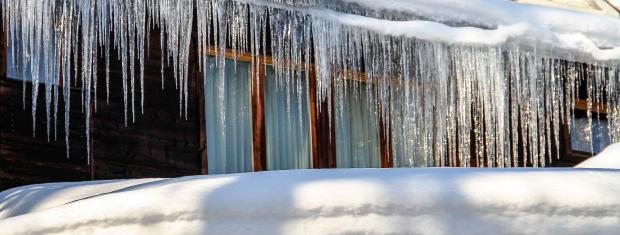
Easy Tips for Preventing Frozen Pipes in Your Home
With winter settling in and temperatures reaching dangerous lows, it’s time to think about protecting your home from the elements. One of the most important precautions you can take is preventing pipes from freezing and bursting. Frozen pipes cause some of the costliest homeowners claims in winter months. Between the water damage cleanup and repair fees, a single pipe burst averages $4,000!
Once a water line falls below 32 degrees, it will start to freeze. When this happens, the ice creates an increase in pressure; once the pressure gets too high, it bursts. We recommend taking these precautions to protect your pipes from freezing:
- Once temperatures start to get very low, it’s beneficial to keep the water line moving. Allow cold water to drip from the faucet served by exposed pipes, you could even let the faucet trickle. Running water through the pipe helps prevent them from freezing.
- Keep garage doors closed if there are water supply lines in the garage.
- Open your bathroom and kitchen cabinet doors to circulate warmer air from your home around the plumbing.
- Maintain a consistent temperature throughout the day and night. By temporarily suspending the use of lower nighttime temperatures in your home - you may incur a higher heating bill, but this will help to prevent your pipes from bursting by providing them with a steady exposure of warmth.
- Check all pipes in your home a few times a day to make sure they are running properly. If one pipe freezes, others may freeze, too.
- If you will be traveling away during cold temperatures, leave the heat on in your home and set the thermostat no lower than 55° F.

A tell-tale sign you might have a frozen pipe is turning your faucet on and only receiving a trickle of water. If you suspect that you might have a frozen pipe, there are a few things you can do to thaw them to prevent further damage:
- Keep the faucet open. Running water will begin to melt frozen areas of the line and prevent the ice from completely closing off the pipe.
- Try to apply some sort of heat around the section of the pipe that is frozen. You could wrap an electronic heating pad around the pipe or wrap pipes with towels soaked in hot water. NEVER use an open flame device such as a blowtorch, propane heater or charcoal stove.
- If you cannot locate the frozen area, if it is inaccessible, or if you cannot thaw the pipe, call a licensed plumber before things get out of hand.


